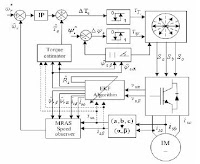A Robust Sensorless Direct Torque Control of Induction
Motor Based on MRAS and Extended Kalman Filter
Abstract
In this paper, the classical Direct Torque Control (DTC) of
Induction Motor (IM) using an open loop pure integration suffers
from the well-known problems of integration especially in the
low speed operation range is detailed. To tackle this problem,
the IM variables and parameters estimation is performed using
a recursive non-linear observer known as EKF. This observer is
used to estimate the stator currents, the rotor flux linkages, the
rotor speed and the stator resistance. The main drawback of
the EKF in this case is that the load dynamics has to be known
which is not usually possible. Therefore, a new method based
on the Model Reference Adaptive System (MRAS) is used to
estimate the rotor speed. The two different nonlinear observers
applied to sensorless DTC of IM, are discussed and compared
to each other. The rotor speed estimation in DTC technique is
affected by parameter variations especially the stator
resistance due to temperature particularly at low speeds.
Therefore, it is necessary to compensate this parameter
variation in sensorless induction motor drives using an online
adaptation of the control algorithm by the estimated stator
resistance. A simulation work leads to the selected results
to support the study findings.

Direct Torque Control bloc diagram of a sensorless IM drives.
More pdf
Sensorless Direct Torque Control of an Induction Motor
Using Fuzzy Controller
Abstract:
In this paper direct torque control DTC of an induction motor is
developed. A new technique for DTC based on fuzzy logic
concept is proposed, where fast torque response with low ripple
in the stator flux and torque of induction motor can be achieved. In
comparison with the conventional DTC simulation results clearly
demonstrate a better dynamic and steady state performance with
the fuzzy logic DTC. The two approaches are explained in clear
details , which are designed using SIMULINK under Matlab Ver.6
software package. Also, MATLAB/FUZZY toolbox is used to
implement the fuzzy logic controller. Both systems are simulated
under the same conditions.
More pdf
SENSORLESS SPEED ESTIMATION OF INDUCTION MOTOR
IN A DIRECT TORQUE CONTROL SYSTEM
ABSTRACT
Fast and robust torque control in a very wide range of speed is
very needed by various industrial AC drive applications.
Therefore, since 1986 [1], direct torque control (DTC) has been
introduced to satisfy this desire. In order to achieve more
economical control, conventional speed sensor has been
replacing by sensorless speed estimation. The sensorless
schemes are used to improve reliability and decrease
maintenance requirements. In this paper, concerned sensorless
techniques of induction machine controlled by DTC algorithm
are openloop estimators and MRAS schemes [2], [3]. To
demonstrate clearly the advantages and disadvantages between
two kinds of sensorless techniques, obtained simulation results
are compared. By enhancing speed estimation, the pure
integrator is replaced by a low-pass filter to avoid DC drift and
saturation problems [2].

MRAS-based speed estimator scheme
More pdf
Sensorless three-phase induction motor direct torque
control using sliding mode control strategy
laboratory set-up for motor speed control teaching
Abstract - A three-phase induction motor direct torque
control laboratory set-up for simulation and
experimental activities is presented in this paper. It
includes both PI controllers and sliding-mode controllers
and uses a sensorless method to estimate rotor speed. The
subject of this set-up is to present to the students a
simulation tool based on Matlab SimPowerSystems
toolbox with the possibility to check simulation results
against a DSP based experimental system. The set-up
provides to the electrical engineering students an
excellent learning tool for non-linear control studies
using as example the variable speed three-phase
induction motor control.
More pdf
More pdf
Sensorless three-phase induction motor direct torque
control using sliding mode control strategy
laboratory set-up for motor speed control teaching
Abstract - A three-phase induction motor direct torque
control laboratory set-up for simulation and
experimental activities is presented in this paper. It
includes both PI controllers and sliding-mode controllers
and uses a sensorless method to estimate rotor speed. The
subject of this set-up is to present to the students a
simulation tool based on Matlab SimPowerSystems
toolbox with the possibility to check simulation results
against a DSP based experimental system. The set-up
provides to the electrical engineering students an
excellent learning tool for non-linear control studies
using as example the variable speed three-phase
induction motor control.
More pdf





No comments:
Post a Comment